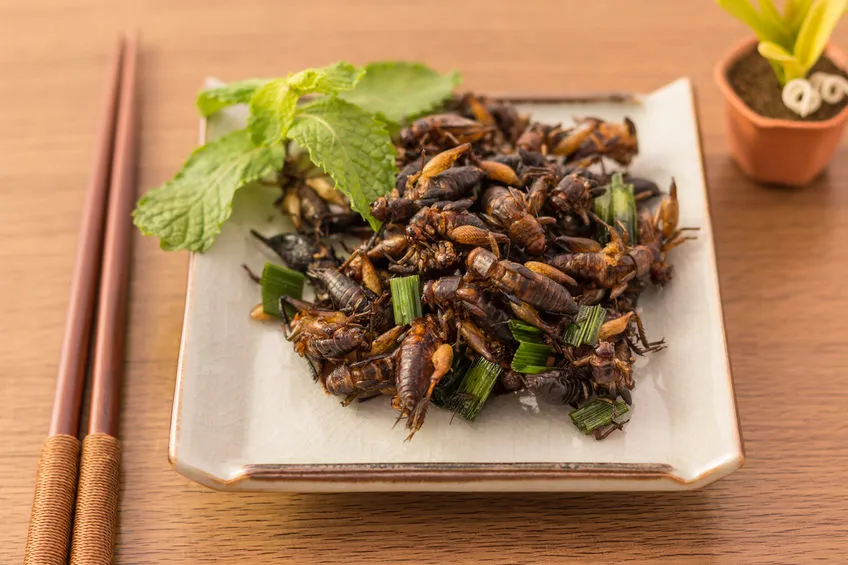Table of Contents
Duggan Flanakin
Duggan Flanakin is a senior policy analyst with the Committee For A Constructive Tomorrow.
Six years ago, the World Economic Forum reported that insects are “good grub,” citing a Meticulous Research study predicting that the global market for edible insects could grow to $1.18 billion by 2023 – triple the 2018 level.
Four years later, another WEF report listed “five reasons why eating insects could reduce climate change.” Topping the list was the argument that edible insects, particularly crickets, can produce equivalent amounts of quality protein when compared to animals.
The WEF also claimed that insects require less care and upkeep than livestock – and less feed, less water, less transport fuel, and less human labor – all with a smaller carbon footprint.
Eating insects is even better for the environment than eating plants, said the WEF, because plants require land and machinery use, water use, manufacturing, processing, and transportation – among other activities during which carbon is emitted.
The third absurdity the WEF cited was that “we’re actually running out of protein.” The Malthusians claimed that the demand for protein for 10 billion earthlings cannot be met. This at the same time that, using artificial intelligence, scientists are creating proteins in laboratories and telling us that, before long, 3D-printed foods of all kinds will be readily available.
Before you choke on cricket legs, the WEF also states that “insects are part of a virtuous eco-cycle.” Indeed, insects that feed on decaying organic materials (spent grains from breweries, they note, along with organic material in landfills) are contributors to “circular agriculture.”
The WEF does not mention here that humans who eat insects are depriving birds, bats, spiders, amphibians, reptiles, fish, other mammals, carnivorous plants, and even centipedes and ground beetles (which we deem as cannibalistic insects) of their essential diets. Not to worry, though, because the WEF suggests we merely ease into insect consumption by feeding them to livestock.
For the record, the insects-for-dinner concept is a newcomer to the ethical and environmentalist scene. Way back in 1944, a small group of vegetarians coined the term “vegan” to describe a lifestyle (unlike regular vegetarians) to not consume dairy, eggs, or any other product of animal origin (including honey).
The Vegan Society calls veganism “a philosophy and way of living which seeks to exclude … all forms of exploitation of, and cruelty to, animals for food, clothing, or any other purpose.” Ethical veganism is based on the belief that “all creatures have a right to life and freedom,” they say. For these and other reasons, vegans do not eat insects.
The WEF does not even consider whether it has offended vegans with its talk of eating bugs. But it was the United Nations’ Food and Agriculture Organization that in 2009 published “How to Feed the World in 2050,” that many say inspired the insect eaters toward a commercialization and widespread adoption campaign.
Four years later the FAO’s follow-up report, “Edible Insects: Future Prospects for Food and Feed Security,” advocated for the nutritional and environmental benefits of consuming insects.
Meanwhile, in 2011, The Wall Street Journal joined the fray, publishing an article, “The Six-Legged Meat of the Future,” which encouraged human consumption of these “sustainable protein alternatives” that are high in protein but with a much lower environmental footprint.
A year later, All Things Bugs, LLC, received a $100,000 grant from the Bill & Melinda Gates Foundation to “develop a method for the efficient production of nutritionally dense food using insect species.” The Grand Challenges Explorations grant authorized a global health and development research project entitled, “Good Bugs: Sustainable Food for Malnutrition in Children.”
Where was People for the Ethical Treatment of Animals when all this was going on? Where was the Vegan Society? Perhaps they were all just celebrating the arrival of Beyond Meat and Impossible Foods – cultured meat burgers made without even insect protein.
But, as Jessica Scott-Reid reports, “there is at least one important difference between bugs and cultivated meat.” Her fellow Sentient Media writer Claire Hamlett argues that “most people don’t think of insects as sentient, despite a growing body of research … testing and demonstrating insect intelligence.”
Today, says Hamlett, we know that bees (among other things) “know their own individual body dimensions, a capacity associated with consciousness in humans.” They also appear to experience both pleasure and pain. Her conclusion? “It now looks like at least some species of insects – and maybe all of them – are sentient.”
For that reason, she says, many researchers who study the intelligence of insects “warn against scaling up the bug farming industry.”
Lest anyone think the question of whether or not to “encourage” humans to eat bugs is a fringe conversation (given the WEF’s gung-ho approach), you might be surprised to learn that at least one major American university has been urging (in a diversity, equity, and inclusion curriculum) to “live like a bug” in order to understand “marginalized” groups.
That information was shared by Daily Signal investigative reporter Tony Kinnett just last month. Kinnett was reporting on a major study by Timothy Minella at the Goldwater Institute which revealed that students who enroll in an entomology course at the University of Arizona are directed to “reflect in personal writing assignments on the assumptions that inform popular attitudes towards insects.”
Are we ready as a society to conclude that eating insects is a grotesque form of cannibalism? Should we now condemn Bill Gates, the FAO, the WEF, and other insect-as-food promoters are monsters assaulting yet another group of “sentient beings”?
Or should we just walk out to the backyard grill and flip the burgers, salmon, and steaks while grabbing another beer?
This article was originally published by CFACT.









